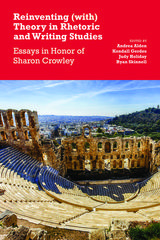2 books by Gerdes, Kendall

Reinventing (with) Theory in Rhetoric and Writing Studies
Essays in Honor of Sharon Crowley
Andrea Alden
Utah State University Press, 2019
Reinventing (with) Theory in Rhetoric and Writing Studies collects original scholarship that takes up and extends the practices of inventive theorizing that characterize Sharon Crowley’s body of work. Including sixteen chapters by established and emerging scholars and an interview with Crowley, the book shows that doing theory is a contingent and continual rhetorical process that is indispensable for understanding situations and their potential significance—and for discovering the available means of persuasion.
For Crowley, theory is a basic building block of rhetoric “produced by and within specific times and locations as a means of opening other ways of believing or acting.” Doing theory, in this sense, is the practice of surveying the common sense of the community (doxa) and discovering the available means of persuasion (invention). The ultimate goal of doing theory is not to prescribe certain actions but to ascertain what options exist for rhetors to see the world differently, to discover new possibilities for thought and action, and thereby to effect change in the world.
The scholarship collected in Reinventing (with) Theory in Rhetoric and Writing Studies takes Crowley’s notion of theory as an invitation to develop new avenues for believing and acting. By reinventing the understanding of theory and its role in the field, this collection makes an important contribution to scholarship in rhetorical studies and writing studies. It will be valuable to scholars, teachers, and students interested in diverse theoretical directions in rhetoric and writing studies as well as in race, gender, and disability theories, religious rhetorics, digital rhetoric, and the history of rhetoric.
Publication supported in part by the Texas Tech University Humanities Center.
Contributors: Jason Barrett-Fox, Geoffrey Clegg, Kirsti Cole, Joshua Daniel-Wariya, Diane Davis, Rebecca Disrud, Bre Garrett, Catherine C. Gouge, Debra Hawhee, Matthew Heard, Joshua C. Hilst, David G. Holmes, Bruce Horner, William B. Lalicker, Jennifer Lin LeMesurier, James C. McDonald, Timothy Oleksiak, Dawn Penich-Thacker, J. Blake Scott, Victor J. Vitanza, Susan Wyche
For Crowley, theory is a basic building block of rhetoric “produced by and within specific times and locations as a means of opening other ways of believing or acting.” Doing theory, in this sense, is the practice of surveying the common sense of the community (doxa) and discovering the available means of persuasion (invention). The ultimate goal of doing theory is not to prescribe certain actions but to ascertain what options exist for rhetors to see the world differently, to discover new possibilities for thought and action, and thereby to effect change in the world.
The scholarship collected in Reinventing (with) Theory in Rhetoric and Writing Studies takes Crowley’s notion of theory as an invitation to develop new avenues for believing and acting. By reinventing the understanding of theory and its role in the field, this collection makes an important contribution to scholarship in rhetorical studies and writing studies. It will be valuable to scholars, teachers, and students interested in diverse theoretical directions in rhetoric and writing studies as well as in race, gender, and disability theories, religious rhetorics, digital rhetoric, and the history of rhetoric.
Publication supported in part by the Texas Tech University Humanities Center.
Contributors: Jason Barrett-Fox, Geoffrey Clegg, Kirsti Cole, Joshua Daniel-Wariya, Diane Davis, Rebecca Disrud, Bre Garrett, Catherine C. Gouge, Debra Hawhee, Matthew Heard, Joshua C. Hilst, David G. Holmes, Bruce Horner, William B. Lalicker, Jennifer Lin LeMesurier, James C. McDonald, Timothy Oleksiak, Dawn Penich-Thacker, J. Blake Scott, Victor J. Vitanza, Susan Wyche
[more]

Sensitive Rhetorics
Academic Freedom and Campus Activism
Kendall Gerdes
University of Pittsburgh Press, 2024
Claims that students are too sensitive are familiar on and around college campuses. The ideas of cancel culture, safe spaces, and political correctness are used to shut down discussion and prevent students from being recognized as stakeholders in higher education and as advocates for their own interests. Further, universities can claim that student activists threaten academic freedom. In Sensitive Rhetorics, Kendall Gerdes puts these claims and common beliefs into conversation with rhetorical theory to argue that critiques of sensitivity reveal a deep societal discomfort with the idea that language is a form of action. Gerdes poses important questions: What kind of harm can language and representation actually do, and how? What responsibilities do college and university teachers bear toward their students? Sensitive Rhetorics explores the answers by surfacing submerged assumptions about higher education, the role of instructors and faculty, and the needs of an increasingly diverse student body.
[more]
READERS
Browse our collection.
PUBLISHERS
See BiblioVault's publisher services.
STUDENT SERVICES
Files for college accessibility offices.
UChicago Accessibility Resources
home | accessibility | search | about | contact us
BiblioVault ® 2001 - 2024
The University of Chicago Press









